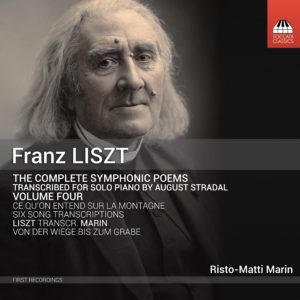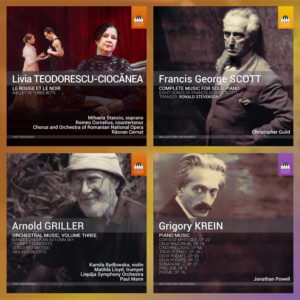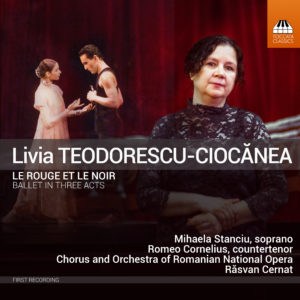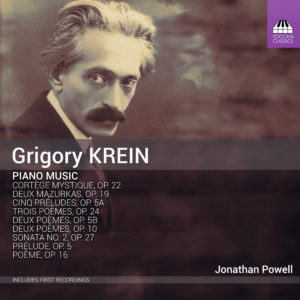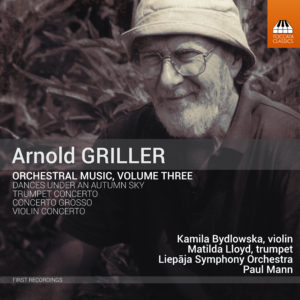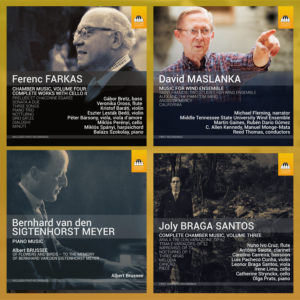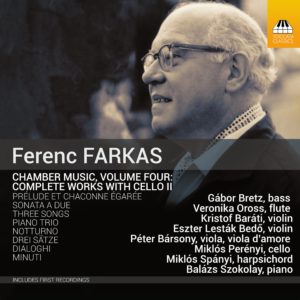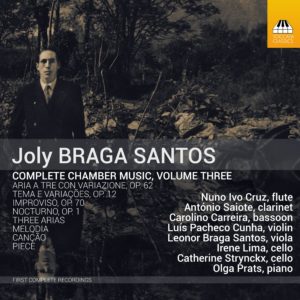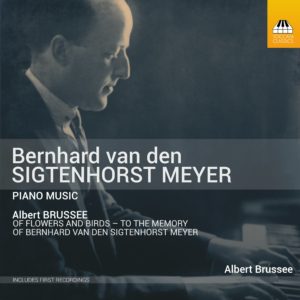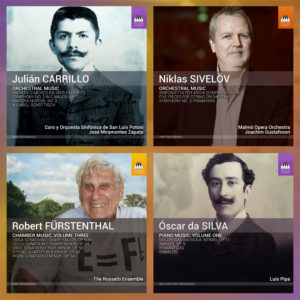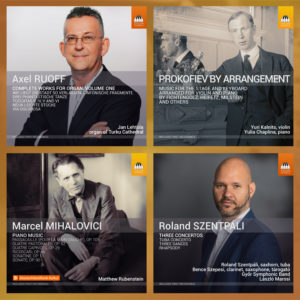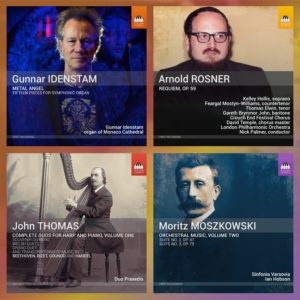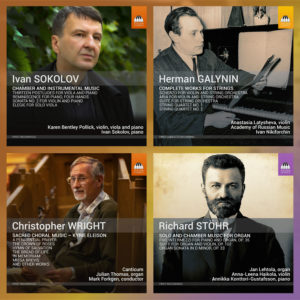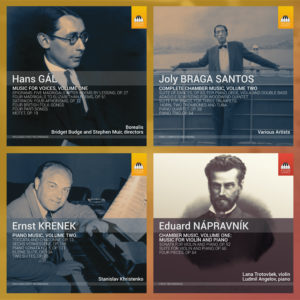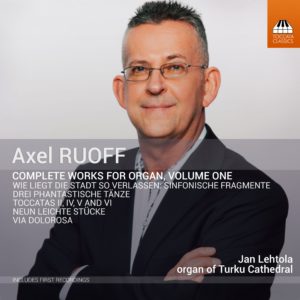Search Results for "Space Wolf: The First Omnibus mp3 torrent" – Page 52
Franz Liszt: Complete Symphonic Poems transcribed by August Stradal, Volume Four
Although Liszt’s thirteen symphonic poems exist in two-piano transcriptions prepared by the composer himself, it was his Czech student August Stradal (1860–1930) who transcribed twelve of them for solo piano – versions which demand almost superhuman virtuosity. Stradal died before he could tackle the last of the symphonic poems, Von der Wiege bis zum Grabe; Risto-Matti Marin has made good that lacuna with his own virtuoso transcription, and adds six of Stradal’s transcriptions of Liszt songs for good measure.
Risto-Matti Marin (piano)
January 2021 Bundle
Included in this bundle:
Livia Teodorescu-Ciocănea: Le rouge et le noir
Le rouge et le noir, the pioneering psychological novel by Stendhal published in 1830, has had a number of adaptations on film but surprisingly few treatments in music. This three-act ballet, premiered in 2000, by the Romanian composer Livia Teodorescu-Ciocănea (b. 1959), rectifies that omission in the grand manner. The atmosphere is dark and passionate, as the novel requires, and the musical language reflects the remarkable tradition of Romanian modernism that emerged in the second half of the twentieth century from the music of Enescu – a distinctive soundworld that blends rich timbral colour with deep roots in Romanian folk-music.
Mihaela Stanciu (soprano)
Romeo Cornelius (countertenor)
Chorus and Orchestra of Romanian National Opera
Răsvan Cernat (conductor)
Grigory Krein: Piano Music
Grigory Krein (1879–1955), a member of an astonishing dynasty of Russian-Jewish musician-composers, was recognised by his contemporaries as one of the major composers of his day. His piano music charts a stylistic evolution from the early influence of Grieg, Reger (with whom he studied) and Debussy towards a more complex and chromatic language with harmonies that synthesise the sound-worlds of Skryabin and Szymanowski; there’s also an echo of the rhapsodic Celtic wildness of Bax. Indeed, all of these pieces are informed by a remarkable sense of energy – latent in some and given its head in others. .
Jonathan Powell, piano
Arnold Griller, Orchestral Music, Volume Three
Three recent works by the English composer Arnold Griller (b. 1937) are joined here by the earliest music he still acknowledges, the gentle and touching Concerto Grosso for string orchestra (1955), which is informed by a serenity and wisdom uncommon in such a young composer. Like Berg’s Violin Concerto, Griller’s (2017) was born of his response to the loss of a young life, and shares Berg’s elegiac awareness of dying beauty; the Trumpet Concerto (2018), by way of deliberate contrast, accumulates energy and vivacity as it proceeds. Dances under an Autumn Sky (2017), subtitled ‘Orchestral Music in Six Scenes’, is a balletic blend of joie de vivre and intense instrumental drama, which shares Stravinsky’s fondness for rhythmic surprises and Tippett’s for angular, primal energy.
Kamila Bydlowska (violin)
Matilda Lloyd (trumpet)
Liepāja Symphony Orchestra
Paul Mann (director)
December 2020 Bundle
Included in this bundle:
Ferenc Farkas: Chamber Music Volume Four: Works for Cello Volume Two
Toccata Classics continues its exploration of the music of the Hungarian composer Ferenc Farkas (1905–2000) with this second of two releases of his chamber works for cello. As with previous albums in this series, the music here features the characteristics that make Farkas’ music so appealing: catchy tunes, transparent textures, buoyant rhythms and a fondness for Baroque forms and folk-dances. Some of these pieces speak a tougher language that show Farkas to have been in touch with his times, but it is the infectious melodic appeal of most of the music here that carries the day.
Gábor Bretz, bass (Tracks 8–14, 18–20)
Veronika Oross, flute (Tracks 3–5, 21–23)
Kristóf Baráti, violin (Tracks 1–2, 6–7, 24–26)
Eszter Lesták Bedő, violin (Tracks 6–7)
Péter Bársony, viola (Tracks 1–2) , viola d’amore (Tracks 6–7)
Miklós Perényi, cello
Miklós Spányi, harpsichord (Tracks 3–5)
Balázs Szokolay, piano (Tracks 24–26)
Joly Braga Santos: Complete Chamber Music, Volume Three
Joly Braga Santos (1924–88) was one of the most important composers in twentieth-century Portugal. In his early works his fondness for modal harmony, absorbed from the Portuguese masters of the Renaissance, and his busy counterpoint combine to make him sound surprisingly close to such particularly English composers as Vaughan Williams and Moeran. Although his harmonic language became more astringent with time, it retained a burly sense of humour and a powerful charge of energy, often infused with the spirit of Portuguese folk-dance.
António Saiote (clarinet)
Leonor Braga Santos (viola)
Carolino Carreira (bassoon)
Nuno Ivo Cruz (flute)
Catherine Strynckx (cello)
Irene Lima (cello)
Luís Pacheco Cunha (violin)
Olga Prats (piano)
Bernard van der Sigtenhorst Meyer: Early Piano Music
The early piano music of the Dutch composer Bernhard van den Sigtenhorst Meyer (1888–1953) suggests the art of the miniaturist painter. These ‘portraits’ of birds, flowers, landmarks and other natural phenomena have the static and studied quality of Japanese prints and owe much to French Impressionism: they sit somewhere between Debussy and Satie, and unfold with gentle, unhurried dignity. Albert Brussee offers a final bonne bouche with his own gentle tribute to Van den Sigtenhorst Meyer.
Albert Brussee (piano)
November 2020 Bundle
Included in this bundle:
October 2020 Bundle
Included in this bundle:
Roland Szentpáli: Three Concertos
This album features three concertante works by the Hungarian composer Roland Szentpáli (b. 1977) for symphonic wind band: a virtuoso tuba concerto, with the composer as soloist; a rhapsody featuring clarinet, saxophone and the smoky tones of the tárogató, a folk instrument that sounds like a feral clarinet; and a double concerto in which Szentpáli takes up the saxhorn. The infectious rhythmic drive of all three works has its origins in the same folk traditions that inspired Bartók, and the scoring has the wallop of the big-band sound – and the solo performances are nothing less than astonishing.
Roland Szentpáli, bass tuba (Tracks 1 – 3), bass saxhorn (Tracks 5 – 7)
Bence Szepesi, clarinet (Tracks 4), soprano saxophone (Tracks 4 – 7, tárogató (Track 4)
Győr Symphonic Band
(Artistic Director: Ferenc Szabó)
László Marosi, conductor
September 2020 Bundle
Included in this bundle:
August 2020 Bundle
Included in this bundle:
July 2020 Bundle
Included in this bundle:
Axel RUOFF: Works for Organ, Volume One
The organ works of Axel Ruoff, born in Stuttgart in 1957, constitute one of the most important contributions to the literature for the instrument by any composer since Messiaen. Stylistically, his music unites the French cathedral tradition of composers like Langlais, Dupré and Guillou with the concern with counterpoint and logic heard in Reger and later German figures. Like Messiaen, Ruoff often finds stimulus in religious sources; unlike him, it is biblical narrative that inspires many of Ruoff’s works, and he uses the unparalleled resources of the modern symphonic organ in his response to some of the most dramatic scenes in the Old Testament, writing music of freewheeling energy and uncompromising power.
Jan Lehtola, organ of Turku Cathedral
Stay In the Know
JOIN THE TOCCATA NEWSLETTER
"*" indicates required fields
By visiting our site, you agree to our privacy policy regarding cookies, tracking statistics, etc.
